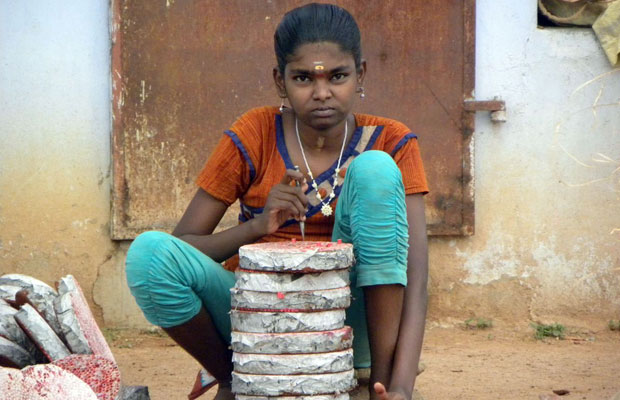
Improving the Standard of Living for Child Slaves
This month, in the lead-up to Ash Wednesday and the sacrifices of Lent, celebrants from around the world marked Shrove Tuesday with traditional foods, costumed parades, live music and jubilant displays of fireworks. Sadly, the euphoria inspired by these pyrotechnics easily masks the grave human rights violations behind their manufacture — a situation Salesian missionaries are working to change.
In the United States, most of the fireworks used for Independence Day and other major celebrations are manufactured in large, regulated factories in China. In highly impoverished nations such as India, however, up to 90% of fireworks are assembled by child slaves.
These little boys and girls — as many as 6,000 of them in southern India alone — are crammed into tiny cubicles, forced to work in dangerous, deplorable conditions for just pennies a day. With no caring adults to advocate for them, they are vulnerable to all manner of risks: physical and emotional abuse; respiratory illnesses such as asthma and tuberculosis; skin diseases and chemical burns; and, in the very worst cases, death due to explosions.
Some children are actually sent to the factories by poor parents desperate for a little extra money — a situation that forever traps them in a cycle of poverty and hopelessness.
“Children who are compelled to work — even for a fraction of the day — are deprived of the education they need to earn a fair living,” says Fr. Mark Hyde, director of Salesian Missions. “Unfortunately in these particular cases, children are being forced to toil around the clock, with barely enough time to eat — let alone study. Their prospects are therefore limited.”
In Sivakasi, a small town in southern India, Salesian missionaries are paying special attention to impoverished youth outside the educational system, who are especially vulnerable to child slavery. Through direct outreach, children involved in fireworks manufacturing and other hazardous industries are offered technical training to prepare them for alternative jobs once they reach employment age. Evening study centers, shelters for homeless youth, support groups and structured leisure activities all function to prevent students from dropping out of school and returning to the factories.
By integrating intensive training in current social issues, in which students learn about child labor, human rights, women empowerment and health and hygiene, among other topics, Salesian missionaries aim to effect long-term social change — creating a future where impoverished youth can attend school and find jobs in dignified, safe and profitable fields.
In more than 130 countries around the globe, Salesian Missions helps impoverished youth and families improve their standard of living through education and trade schools, women empowerment programs, and tireless advocacy on behalf of the marginalized. Through your caring friendship, you make our mission your mission. Thank you for your support.

